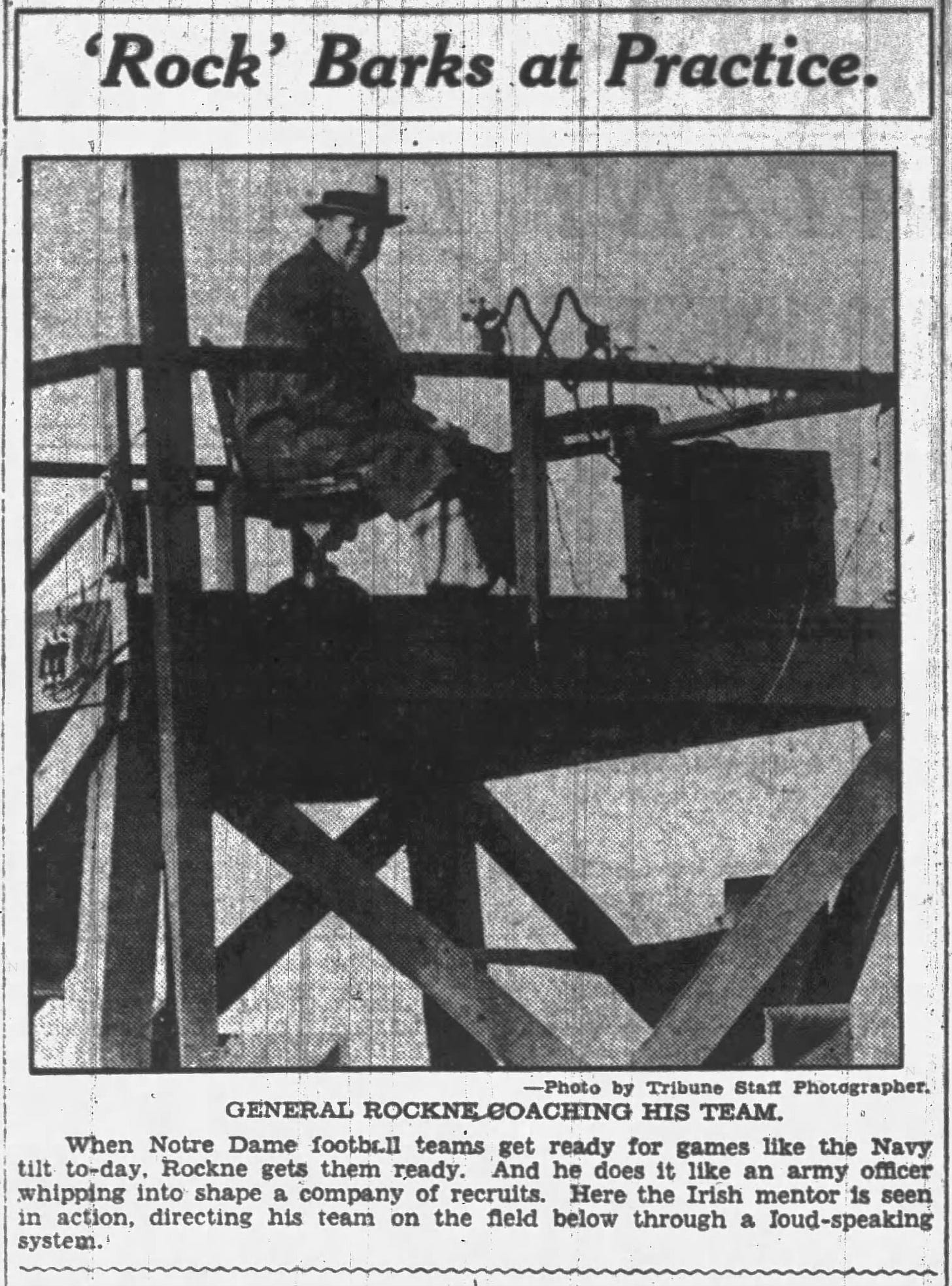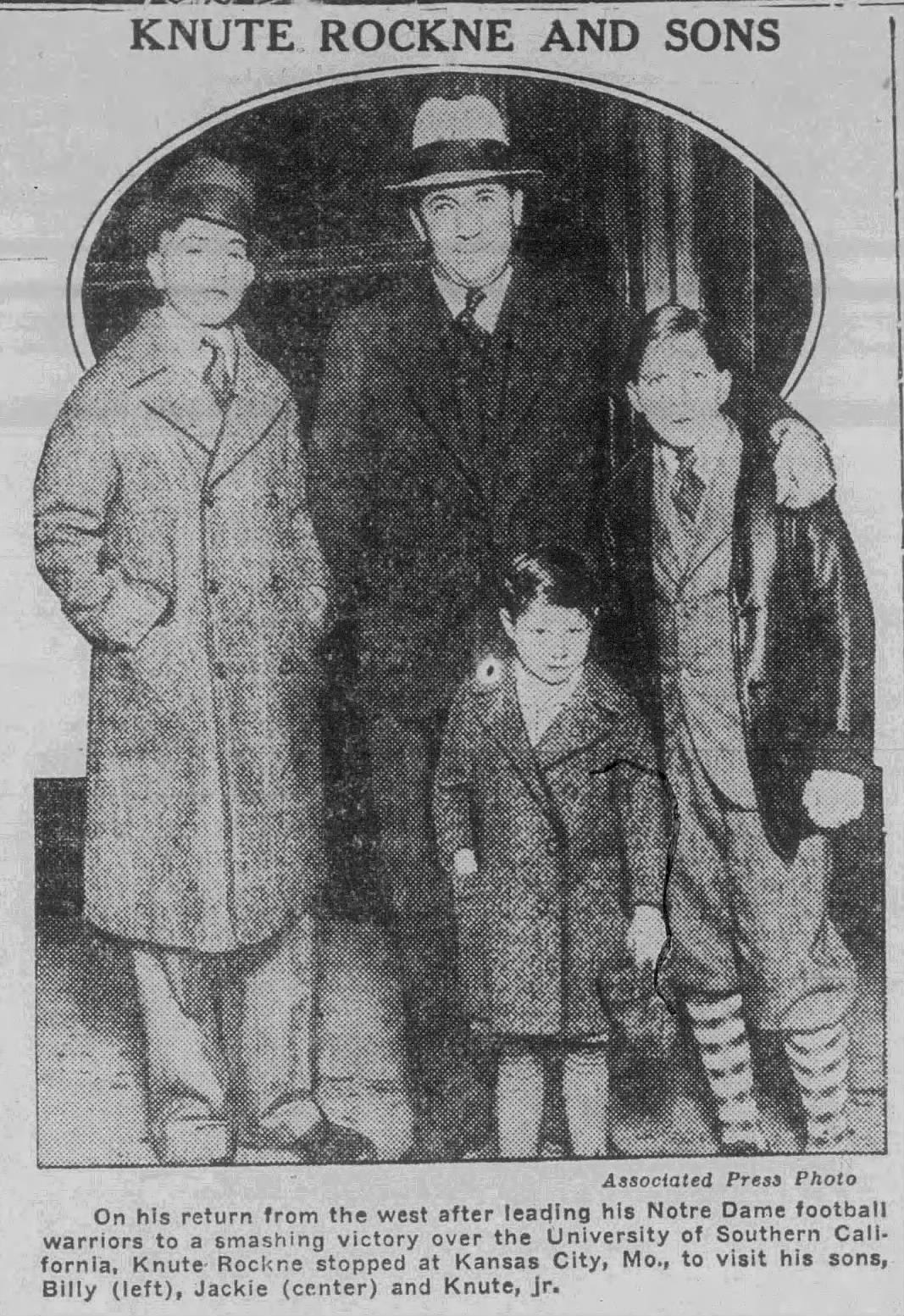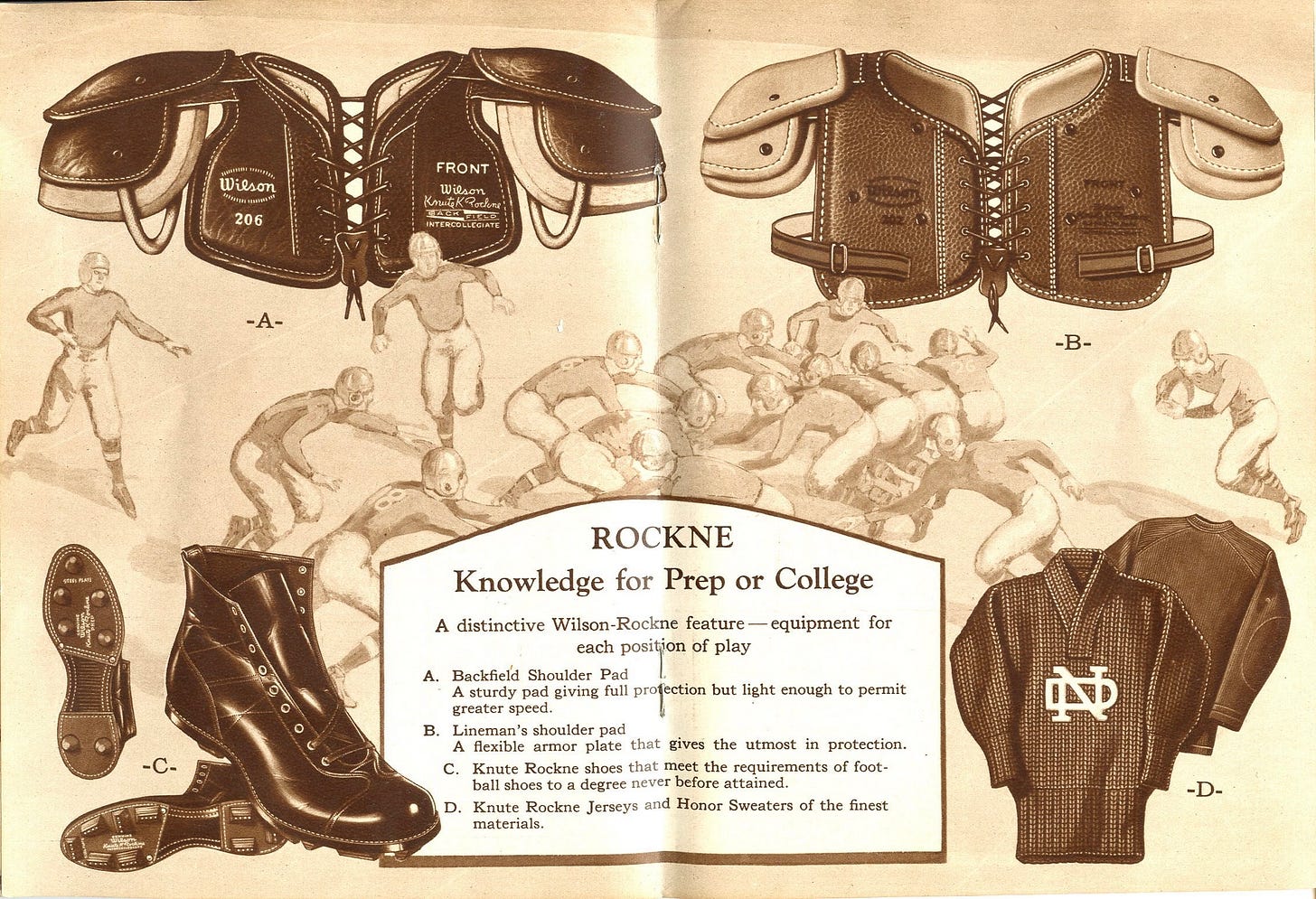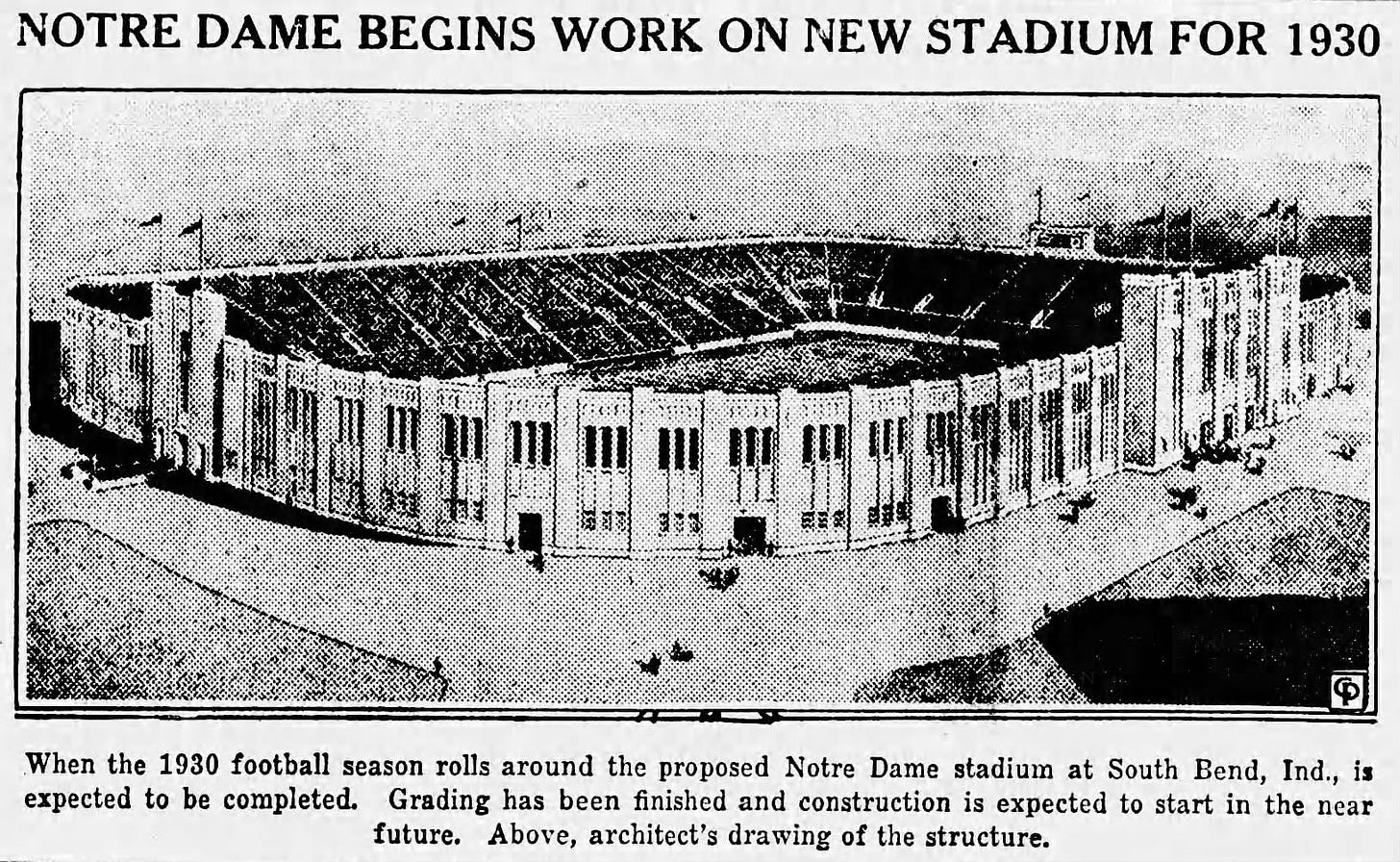A Conversation with Knute Rockne III
Among my favorite aspects of writing Football Archaeology and a few books is that I sometimes hear from descendants of the people I write about. Most of the people I write about are relatively obscure today. Still, it is fun to compare the family stories to the information I found; my research sometimes reveals elements of the ancestors' lives that their descendants did not know or refutes stories they thought they knew.
Recently, I reached out to Krista Rockne after reading an article she wrote concerning the correct pronunciation of her grandfather's name, Knute. (Knute is pronounced Canute in the Rockne family, regardless of how outsiders have pronounced it over the years.)
Krista connected me with her father, Knute Rockne III, the grandson of Notre Dame's famous coach. The three of us sat down for a Zoom conversation to discuss his views on college football today, and his grandfather's life and legacy.
Knute Rockne III grew up in South Bend, played football at Utah State, and coached football, track, girls' basketball, and girls' track during a high school teaching and coaching career that spanned four Western states, mostly in Utah. He was a coach whose impact on his athletes was greater than the records they achieve. One former athlete, Kyle Whittingham, now a defensive quality control coach with the Kansas City Chiefs, when asked about his high school memories, shouted out one faculty member: “ Lastly, my man Knute Rockne. Great coach, even better person.”
His grandfather was killed in a plane crash in 1931 when his youngest son and Knute III’s father, Jack, was five years old, so Jack had few personal memories of his father to pass along to Knute III. Today, Knute III regrets not talking more about his grandfather with his dad's older siblings since they knew Knute I firsthand.
Many of the best stories Knute III heard about his grandfather growing up came at the kitchen table. His boyhood home in South Bend was a regular stop for Rock's former players who passed through town. The Four Horsemen, Monty Stickles, George Izo, and others visited, and if the visits lasted long enough, they had all the beer bottle caps needed to diagram old plays on the kitchen table. Those conversations were Knute III's introduction to the strategic side of football.
As one can imagine, growing up in South Bend with the Knute Rockne name was a blessing and a curse, though far more the former than the latter. Still, when it came time to attend college, he chose one far from home, following in his father's footsteps as a Utah State athlete rather than his grandfather's in South Bend. So, Knute III went west and never looked back, though he returned often.
An "underutilized" wide receiver for the Aggies, his biggest catch at Utah State was Patsy, a Logan, Utah, native who agreed to marry the soon-to-be teacher. They spent the first 7 to 8 years of marriage moving from West Grand (CO), Frederick (OK), North Glen (CO), East Carbon (UT), and finally Brighton (UT), where he spent the next 30 years teaching and coaching.
He, or his name, was a story everywhere he went, as he was profiled in newspapers nationwide at every new stop or on anniversaries of his grandfather's accomplishments. Whatever burden came with carrying the name as a young man disappeared and became something to enjoy and celebrate as life progressed. Today, Knute III is perfectly comfortable in his own skin and his grandfather's legacy, which is part of who he is.
I've paraphrased and reorganized my questions and Knute's answers for readability purposes.
Your name is bound up in football history. Before talking about that, however, let's cover your view on several of today's hot football topics. What is your view on NIL and payments to college athletes?
I hate it, hate it. I'm not a fan and don't favor the portal as it exists now. Kids should have a right to transfer, but I wish more control existed. You should only be able to access the transfer portal two times a year: at the end of spring ball and sometime during the summer.
I don't have a problem with paying the kids. [At Utah State] we were given $15 monthly in NCAA laundry money. You'd get it on a Friday, and go out to eat on Saturday night, and most of it was gone. That was supposed to last a whole month.
How about Notre Dame joining a conference, and why does it make sense for them to join the Big Ten?
Well, fortunately for me, I don't ever have to answer that question.
I like the idea of Notre Dame being independent because they have been, and that goes back to Grandpa, the fact that Notre Dame was the first true coast-to-coast football team.
If they joined a conference, they may have to drop teams like Stanford, USC, Navy, or Army, which were historically huge games.
Joining the Big 10 would be awesome. I'm not in favor of the 16- to 18-team conferences. I love the tradition of the geographic conferences. You know the SEC—that is truly SEC—the Big 10, the Southwest, the Pac 10.
I share the same name as another Notre Dame legend, Heisman Trophy winner Tim Brown, though few mistake me for him, much to his chagrin. Over the years, you surely encountered situations in which your name led to interesting encounters.
Growing up, Dad had several good friends at Notre Dame, one was Coach George Kelly (a 17-year football assistant). Whenever we needed tickets for away games, we would call Coach Kelly, and he always found a way to get us some tickets.
When my sons were 11 or 12, Notre Dame played at Air Force [in 1987]. I called Coach Kelly. The secretary answered, and I said, "Hello! My name is Knute Rockne, and I would like to speak to Coach Kelly. Would you please let him know I'm calling?"
And she said, "Oh, no, you're not him. You're dead!" And she hung up on me, and so it flustered me for a minute.
I waited a few minutes, then I called back and said, "I know this may sound crazy, but I am Knute Rockne, and Coach Kelly has some football tickets for me, and I need to touch base."
She said, "Oh, you can't fool me with that one. Everybody calls and says they're Knute Rockne, thinking you're going to get special treatment. I know better," and she hung up again.
Well, what do I do now? How do I get a message to Coach Kelly?
I called a third time and said, "Okay, ma'am. I know you probably don't believe this, but would you please tell Coach Kelly I called? It is important that I speak to him, please."
She put the phone down and, I guess, went into his office. When she came back, she couldn't apologize fast enough. "I'm so sorry. I'm so sorry. I didn't know. I didn't know it."
That's one of my favorite stories—when Notre Dame turned down my ticket request.
There have also been times when I tried to write a check and they wouldn't accept it because I was dead, and everybody knew that, so....
Are there family stories that reveal aspects of your grandfather that most don't know?
There is one that my grandmother used to tell.
Grandpa was not very handy with tools, which is funny because his father was a carriage maker. Anyway, they were in one of their first houses when Uncle Bill was one or two, and Grandma wanted a screen door put on the back to keep Uncle Bill from going out and to let the cool breeze in during the summertime.
Grandma arranged for a handyman to install the screen door, and Grandpa got rather mad, saying, "I could put it on."
He spent all day and made numerous trips to the hardware store to get the right hinges, handle, spring, and the whole shebang to put it in.
But when he finally had the screen door in place, Grandma came out and looked at it. Grandpa had put it on backwards, so it wouldn't open.
I enjoy "what might have been'" stories. Are there instances from your grandfather's life in which a different decision might have changed his career and football history?
There are two stories from before he started coaching.
One, Grandpa initially wanted to go to the University of Illinois. He worked as a postal clerk, and when he had saved up $1,000, he went to the train station to go to Illinois for school. Fortunately for Notre Dame, the train was late.
Because the train was late, he sat in the waiting room and ran into two friends from AAU track. They were going to Notre Dame, and they stopped and talked to Grandpa, and said, "Well, here's how much it costs to go to Notre Dame. For $1,000, you can get almost two years' worth of room and board and tuition, so Grandpa turned around and left. He went to Notre Dame instead.
The other story came when he planned to attend medical school. Grandma said that when Grandpa graduated, he wanted to attend medical school. He applied to Washington University in St. Louis and was in the process of enrolling. He had a friend who played at Notre Dame and coached at a St. Louis high school.
He planned to coach the high school team with his friend to make a little extra money. One of the deans or the Director of Admissions told him he could not do that. And so, Grandpa said, "Well, then, I'm not going to go."
Now, whether that was the reason why Grandpa walked away from med school, I don't know. That's just a story I was told.
[I wrote a similar story in the past based on newspaper reports involving St. Louis U rather than WashU.]
You and I are having this conversation in March 2025. One hundred years ago, your grandfather was coming off Notre Dame's first national championship season and a 1925 Rose Bowl win. Knowing what happened over the next 100 years, if you could go back and talk to your grandfather in the spring of 1925, what advice would you give him?
At this point in the conversation, Krista Rockne jumped in, saying, "Take the train!"
After a good laugh, Knute III continued:
"Honestly, I don't know if there's anything I could say if I could go back. I would want to go and be a grandson to Grandfather. I would like to be around him, the part of my life I missed. Fortunately, I got to know my grandmother growing up because she was still alive, but even so, she died when I was fairly young (7 years old).
So, as I would have loved to have been around her more, that's what I would have enjoyed. Just to have sat, been quiet, and listened.
I'm not an expert on your grandfather, but my impression is that he took advantage of every opportunity to make money.
When Grandpa and Gus Dorais were captains at Notre Dame, the southeast corner of Sorin Hall had a room called Captain's Corner. It was the biggest room in the dorm on the ground level and had two windows. The captains of the Notre Dame football team automatically got that room.
When Grandpa and Gus Dorais were living there, Grandpa ran a little shady deal to make money since they locked the doors to Sorin Hall at curfew.
Well, Grandpa organized a system where somebody could knock on the window, and he and Gus Dorais would let him in for a price. You had to pay the toll, which I always thought was funny.
When he was coaching, a lot of what Grandpa was doing was to make money to provide for Grandma. He grew up in poverty, and his dad was sick, and he had to leave high school to work, and so a lot of that was fueled just by having that financial security.
[Knute Rockne died in 1931, and the Social Security System did not start until 1935. He helped support his mother, who lived until 1944, and his wife until 1957.
Rockne earned money endorsing Wilson and other equipment brands while coaching.]
If you look at the equipment side, he worked with the designers and endorsed equipment to promote the game to make it a better game. The other stuff he did, like with Studebaker, and some of the books he wrote, was probably profit-making. But when it came to the game of football, everything he did was try to promote the game. He wrote articles so people could understand how to watch a football game to tell if it was a good or bad game. The books that he wrote emphasized clean sportsmanship, fair play, you know the ideals of the game for that period. And so, he made money, but there was a greater value than just the money he made.
And another thing, he didn't make money from it, but there is a company in South Bend called Electro-Voice. It started during his last few seasons when he was sick and couldn't project his voice. [He also had blood clots in his legs, restricting his mobility.]
So, they built a PA system for him. It was attached to a Studebaker Rockne car. He'd sit in the back seat, look out the windows. He could drive up and down the practice field and talk as they practiced. He would say, "Bring me my electric voice." And this company took that the electric voice, and they became Electro-Voice. And now they're well known for their microphones.

Given everything written about your grandfather, if there were a handful of takeaways of how he viewed or impacted football, what would those be?
The first is that football is now a national game when it wasn't before. We were talking about conferences, and one of the reasons why they were all geographical, regional conferences is that people never traveled more than 6 hours by train from one place to another.
Notre Dame was the first team to make intersectional games the norm, playing Army, Navy, and especially, USC every year. They were known as the Ramblers before the Fighting Irish became common.
Another thing that Grandpa was very, very adamant about was for football to be an extracurricular sport. You could excel at football, but it never replaced an education.
The purpose of the NCAA was originally to be an organization that promoted academic and athletic standards. Sometimes I think it gets lost in the one-and-done era, where I'm gonna come in and play. Grandpa was not a very big fan of pro football in its infancy.
The third thing, I often wonder what Grandpa would say about the 100,000 people who attend some games?
I commented to my grandson two weeks ago, when we went back for the spring game. We were sitting in the stands and looking around the stadium, and it was almost as full as for regular home games.
There's a story about when Grandpa built the stadium. When Grandpa built the stadium, it was at the eastern end of the campus. Absolutely nothing was there but the stadium. Just fields and fields surrounded it.
When Grandpa was called before the governing board at Notre Dame, he laid out the blueprints for the stadium. One of the priests said, "Okay, here's your stadium. Why do you have all of this open ground here?"
And Grandpa said, "That's for parking."
And the priest said, "You'll never get that many cars here."
I wonder what Grandpa would say if he returned to campus on a Saturday game day. The sheer size of it. It's like its own little town.
Of course, Knute Rockne was proven right. Notre Dame needed lots of parking for those attending games in South Bend in future years, and college football in generally has witnessed similar growth.
Knute Rockne's life presented opportunities in which he might have taken a different path; he didn't take them, and the game is left with the legacy he and many others created. His .881 win rate remains the highest among major college coaches, while one of his players, Frank Leahy, lands in second place at .864. Rockne had an outsized impact on college football during the 1920s -the Golden Era of Sports- and as a giant among coaches, he casts a shadow like few others.
Thankfully, while he still casts a shadow over his descendants, the shadow is celebrated and embraced as a source of amusement and pride that comes with the name.
Click Support Football Archaeology for options to support this site beyond a free subscription.







I had an Electro-Voice mic; top quality. I still have a now-unusable Stahly blade razor, with a wind-up vibrating handle--also made in South Bend. Maybe Rock endorsed Studebakers ..
I think Chicago has a good case for being the first transcontinental team, playing Stanford (in Palo Alto) in 1894 and Penn in 1897. They didn't really plough the field, though ..
Great read! Thank you so much for this.